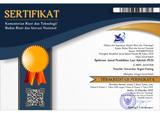Knowing the Character Values Implemented by Teachers in School and How To Do It.
 ), Zahratul Azizah(2), Ilpi Zukdi(3),
), Zahratul Azizah(2), Ilpi Zukdi(3), (1) Universitas Negeri Padang
(2) Universitas Negeri Padang
(3) Universitas Islam Negeri Imam Bonjol Padang
 Corresponding Author
Corresponding Author
DOI : https://doi.org/10.24036/spektrumpls.v10i3.118884
Full Text:
 Language : en
Language : en
Abstract
This research begins with the many phenomena of character deviation in children in Indonesia. This study aims to determine the description of the character education model implemented by teachers in PAUD. The research method uses R & D with the development model using ADDIE. The population consists of parents of early childhood. Data collection is done by distributing questionnaires to respondents. This research is only in the early stages of analysis and design. The results show that habituation is generally used by teachers to instill religious values, independence, and help, while to instill the values of honesty and tolerance they tend to use the example of the teacher. Instilling the values of discipline and responsibility using rules.
Key words: recognize, character building, early childhood.References
Adnan, A., Dilshad, M., & Khan, M. Y. (2016). Effectiveness of Early Childhood Education Program in Govt. Schools of Punjab: A Situational Analysis. Research on Humanities and Social Sciences, 6(17), 40–46. www.iiste.org
An-Nur.1998. Al-Qur’an dan Terjemahannya (Ayat pokok bergaris, Semarang: As-syifa.
BEM REMA UPI. 16 Oktober 2018. Fakta Dibalik Anak Indonesia: Indonesia Gawat Darurat Pendidikan Karakter. Diakses tanggal 22-8-2022. http://bem.rema.upi.edu/fakta-dibalik-anak-indonesia-indonesia-gawat-darurat-pendidikan-karakter/
Boshkova, G., Shastina, E., & Shatunova, O. (2018). The role of grandparents in the child’s personality formation (On the material of children’s literature). Journal of Social Studies Education Research, 9(2), 283–294. https://doi.org/10.17499/jsser.14474
Cahyaningrum, dkk., 2017. Pengembangan Nilai-Nilai Karakter Anak Usia Dini Melalui Pembiasaan Dan Keteladanan. Jurnal Pendidikan Anak. Volume 6, Edisi 2, Desember 2017.
Denboba, A., Hasan, A., & Wodon, Q. (2015). Early Childhood Education and Development in Indonesia. The World Bank. https://doi.org/10.1007/978-94-024-0927-7_43
Kesuma, Dharma. 2012. Pendidikan Karakter Kajian Teori dan Praktik di Sekolah. Bandung: PT Remaja Rosdakarya.
Kirana, Zuyyina Candra. 2021. Orang Tua Figur Idola Anak: Konsep Pendidikan Pola Asuh Islam. Mu’allim Jurnal Pendidikan Islam. Vol. 3 No. 2 Bulan Juli 2021.
Khaidir, Avriva dan Prayitno. 2010. Model Pendidikan Karakter Cerdas. Universitas Negeri Padang.
Muslich, Masnur. 2013. Pendidikan Karakter Menjawab Tantangan Krisis Dimensional. Jakarta: Bumi Aksara.
Ormrod, Jeanne Ellis. 2009. Psikologi Pendidikan Membantu Siswa Tumbuh dan Berkembang. Terjemahan oleh Rikard Rahmat (Ed). 2009. Surabaya: Erlangga.
Rao, N., Sun, J., Wong, J. M. S., Weekes, B., Ip, P., Shaeffer, S., Young, M., Bray, M., Chen, E., & Lee, D. (2014). Early childhood development and cognitive development in developing countries. Education Rigorous Literature Review, September, 1–100. http://cerc.edu.hku.hk/wp-content/uploads/ECD-review.pdf
Rifai, Melly Sri Sulastri. 2009. Ilmu Pendidikan dan Aplikasi Pendidikan. Bandung: Pedagogiana.
Subijanto. (2014). Lembaga Paud Di Lingkungan Perumahan Untuk Early Childhood Education. Jurnal Ilmiah VISI PPTK PAUDNI, 11(84), 1–12.
Syuraini, S., Wahid, S., Azizah, Z., & Harun Pamungkas, A. (2018). The cultivation of the character values of early childhood by parent. International Conferences on Education, Social Sciences and Technology, 462–466. https://doi.org/10.29210/2018167
Tayler, C., Cloney, D., Adams, R., Ishimine, K., Thorpe, K., & Nguyen, T. K. C. (2016). Assessing the effectiveness of Australian early childhood education and care experiences: Study protocol. BMC Public Health, 16(1). https://doi.org/10.1186/s12889-016-2985-1
Ulwan, Abdullah Nashih. 2009. Pendidikan Anak dalam Islam. Jakarta: Pustaka Amani.
 Article Metrics
Article Metrics
 Abstract Views : 184 times
Abstract Views : 184 times
 PDF Downloaded : 57 times
PDF Downloaded : 57 times
Refbacks
- There are currently no refbacks.

This work is licensed under a Creative Commons Attribution-NonCommercial 4.0 International License.



